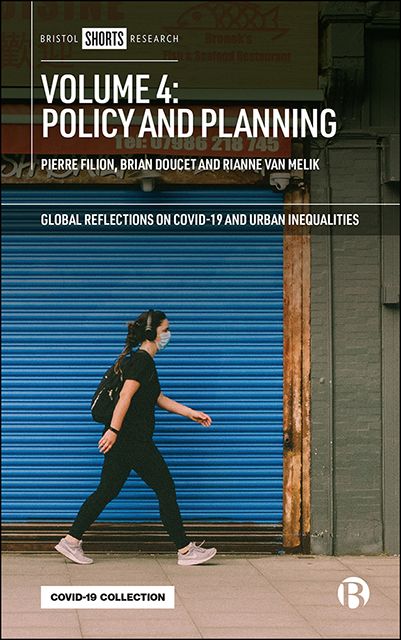Book contents
- Frontmatter
- Contents
- List of Figures and Tables
- Notes on Contributors
- Acknowledgments
- Preface to All Four Volumes of Global Reflections on COVID-19 and Urban Inequalities
- One Introduction: Policy Making in the Face of Uncertainty and Inequality
- Part I COVID-19 and Urban Changes
- Part II The Pandemic, Social Inequality, and Mobilization
- Part III Municipal and Urban Policy Responses
- Index
Seventeen - COVID-19 and the Creative City: Lessons from the UK
Published online by Cambridge University Press: 25 April 2023
- Frontmatter
- Contents
- List of Figures and Tables
- Notes on Contributors
- Acknowledgments
- Preface to All Four Volumes of Global Reflections on COVID-19 and Urban Inequalities
- One Introduction: Policy Making in the Face of Uncertainty and Inequality
- Part I COVID-19 and Urban Changes
- Part II The Pandemic, Social Inequality, and Mobilization
- Part III Municipal and Urban Policy Responses
- Index
Summary
Introduction
Since the 1990s policy makers have paid increasing attention to ‘creativity’ as a potential source of job creation, urban renewal, and post-industrial growth. Within this context the ‘creative city’ became an influential idea. It describes an approach to urban development that takes account of the rising significance of the creative economy and seeks to make planning processes themselves more creative (Florida, 2002; Landry, 2008). Creative city thinking has been widely critiqued, yet its influence persists. In this chapter, we consider the implications of COVID-19 for the creative city ‘script’ and explore what the pandemic reveals about the need for new approaches to urban cultural policy. (Chapters Five and Six also address sectors of the economy that are disproportionally ravaged by the pandemic.)
The creative city and inequality
In the last two decades, the creative city has become a popular branding and policy script for cities all over the world. The ‘creative’ tag is associated with a range of feel-good factors, evoking opportunities for self-expression, imagination, and human connection. However, in the case of the creative city, there is now a broad literature suggesting that ‘creative’ is not used in these human-centered ways (Pratt, 2011). Instead it is used to mobilize specific political priorities: promoting GDP growth via creative economy, global competition among entrepreneurial cities, and top-down intervention to redevelop urban spaces.
A range of authors have intervened to unmask these neoliberal agendas. Chatterton (2000) was one of the first, characterizing the creative city as a branding exercise that does not involve citizens in defining their role in the places they live and work. Others consider the contradiction between the fact that artists and creatives shape cities, and are encouraged to do so, but then become victims of processes of redevelopment, gentrification, and top-down intervention that reduce their space and civic agency (Novy and Colomb, 2013; McLean, 2014). Ultimately these tensions between different stakeholders – each interested in their city and its future – are grounded in diverging priorities and values. There is a continuous struggle to reconcile the interests and views of cultural producers, and possibilities for everyday citizenship, with neoliberal agendas which do not prioritize urban inclusivity and long-term sustainability.
- Type
- Chapter
- Information
- Volume 4: Policy and Planning , pp. 179 - 188Publisher: Bristol University PressPrint publication year: 2021



